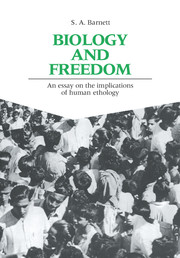Book contents
- Frontmatter
- Contents
- List of illustrations
- Preface
- Acknowledgements
- Part 1 An introduction
- Part 2 Homopugnax: the violent species
- Part 3 Homo egoisticus: the selfish species
- Part 4 Homo operans: the greedy species
- 10 Conditioning and improvisation
- 11 Work and play
- Part 5 Homo sapiens: the human species
- Glossary
- Notes
- References
- Name index
- Subject index
10 - Conditioning and improvisation
Published online by Cambridge University Press: 04 August 2010
- Frontmatter
- Contents
- List of illustrations
- Preface
- Acknowledgements
- Part 1 An introduction
- Part 2 Homopugnax: the violent species
- Part 3 Homo egoisticus: the selfish species
- Part 4 Homo operans: the greedy species
- 10 Conditioning and improvisation
- 11 Work and play
- Part 5 Homo sapiens: the human species
- Glossary
- Notes
- References
- Name index
- Subject index
Summary
The confusion and barrenness of psychology is not to be explained by calling it a ‘young science’; its state is not comparable with that of physics in its beginnings. … For in psychology there are experimental methods and conceptual confusion. … The existence of the experimental method makes us think we have the means of solving the problems which trouble us; though problem and method pass one another by.
WittgensteinIn the epigraph of Chapter 7 I quote the Sokratic question: is virtue innate in a person, or must it be acquired by experience? In the dialogue that follows, Plato turns to asking whether knowledge is innate, and concludes that, in a sense, it is. But for more than two centuries it has been more usual to reject the idea of a store of wisdom (or of original sin) available at birth. Sociobiological doctrine is in this respect exceptional.
The two images outlined in the present chapter try to explain how knowledge arises from experience. The first was designed to give a physiological account of behavior and even of the mind, and so was a development of the notion that the body is a machine. Physiologists have been successful because they study what can be directly observed: they measure heart rate, blood pressure, electrical changes in nerves, the rates of secretion of glands and much else. When learning was to be similarly studied, it was clearly learned behavior that could be recorded and measured.
- Type
- Chapter
- Information
- Biology and FreedomAn Essay on the Implications of Human Ethology, pp. 177 - 206Publisher: Cambridge University PressPrint publication year: 1989



